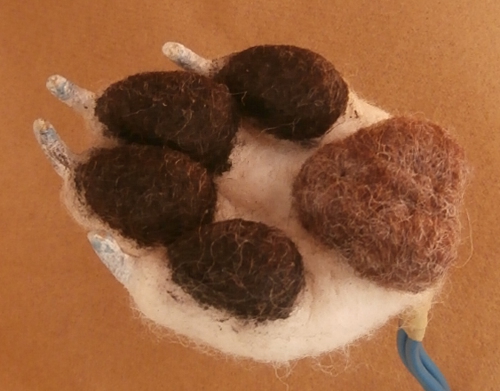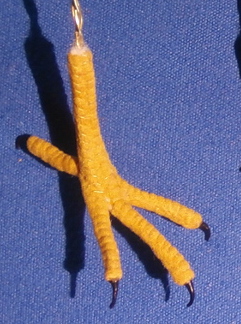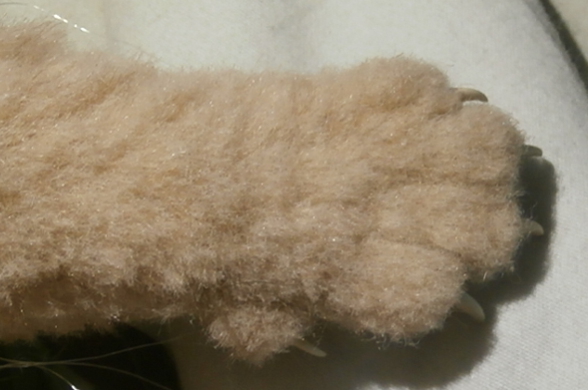For artists and collectors sponsored by Intercal...your mohair supplier and Johnna's Mohair Store
Congratulations, Peter!  I really enjoyed reading the article.
I really enjoyed reading the article. 
What a perfect little cutie, well done! I especially like the feet. 
I also have this problem, with needle felting I tend to make the same mistakes as on my sewn designs. I guess it's hard to go against your style. 
I know this feeling too well!  I had 20 needles, now I only have 2 left and I don't dare to use them anymore until I can order new ones. I guess I'll need another 20 to complete my project.
I had 20 needles, now I only have 2 left and I don't dare to use them anymore until I can order new ones. I guess I'll need another 20 to complete my project. 
What kind of face do you make, is it a bear or something else?
Cute, but why don't you show a finished one? This is the showcase after all, a place to post pictures of your completed handmade creations. 
If aquarim gravel is too big, you could look for grit (little stones to feed birds). I have some for my budgies that is nearly as coarse as steel shot, but the stones are not round and have a rough surface.
Or you could buy these small glass beads (seed beads?), maybe you can find a cheap multicolored pack for children necklaces.
Ok now I understand, dolly! 
You are right, the company used different furs, the white face and dark eye patches are just sewn in. Both bears have a dark shade over the nose, that was painted.
Some paints fade quite fast, others doesn't, depending on the quality. I never had problems with fading, but I started useing paints only a few years ago and always keep my plushies out of the sunlight.
Hi dolly!
I'm not sure what you mean. There are realistic furs with different colored tips, so when you shorten the hair on the muzzle it has another (mostly lighter) colour.
The bear in your link was painted around the nose and eyes. I like to use acrylic paints for shadings like this. You can read more about it in the library.
I hope this was at least a little helpful. 
I've only felted one large sculpture and used a styrofoam base, it worked quite well.
This cute panda named Ty was made by Tammy/Beckoning Bears:
http://beckoningbears.blogspot.co.at/20 … et-ty.html
The first nose is modelled of epoxy (maybe the lips also?).
The second bear was made by Karin De Lorenzo, right? Then I guess the nose was probably needle felted and sealed with silicone.
I tried both (and a lot of other techniques), but MY noses didn't look that good.  It's probably not enough to know how it was made...
It's probably not enough to know how it was made... 
I guess every artist has their own way to make this...
The first picture looks as if the clay nose was modelled a little bigger and some fur were glued to the edges to cover them.
On the second picture the nose looks normally attached and the lips normally sewn (even though I don't know what material was used for the lips and how the teeth were attached), but the shading looks very realistic. I think the fabric backing was painted black (this has to be done from the backside to leave the hair white), so the "black skin" can be seen through the fur, like on a real polar bear.
Yes, very likely homemade. I think the fur could also be sheepskin, but it's hard to tell from pictures.  Is it normal fabric or does it have a leather backing like real fur?
Is it normal fabric or does it have a leather backing like real fur?
I would finish the bear with a normal neck (the neck part can be made of cheap fabric) and than drape the plush over it to form the ruff. This may take a little longer, but the pattern is easier to make and it would feel natural since you can stuff the body and inner neck as hard as you wish but leave the outer ruff soft with only a little filling.
If you want the head to be moveable you can make a backbone, I think this would work very well with the ruff.
I love that blue fur, it will make a lovely bear, but a cloak from it must be awesome! 

Hi Francesca, you could order it here: http://shop.modellpferdeversand.de/
I would like to see a complete teddy skeleton, wouldn't that be cool? 
Staphanie Metz has made a lot of unique sculptures, take a look at her website:
http://www.stephaniemetz.com/portfoliocurrent.html
Some are rather disturbing, but all of them are beautiful in their own way. 
Kittie litter would definitely be a bad idea. If the teddy gets a little wet he would be hard to dry and afterwards he would have a big lump in his body. 
Sounds good to me. Why don't you give it a try?
I have some eyes just for practise (I scrape the paint off to reuse them) since it's different with every kind of paint and look you want to achieve.
Especially step 4. can be tricky. Often it's easier to scrape the paint while it's still wet or not completely dry, I always have to experiment a few times to get a feeling for it.
For slim shoulders the joint discs have to be nearly the biggest size that fits into the unstuffed arm. So you can either use bigger joints or make the arm pattern slimmer (just a little bigger than the discs you want to use).
Good luck! 
I wondered about that too! Maybe the difference is easier to understand for native English speakers?
For me, a plushie is made of textile and like you described - floppy and cuddly, more or less a toy.
A doll can be made of any kind of material but for me it sounds like something anthropoid, not a real animal.
I refer to my own creations as stuffed animal (sounds more dignified than plushie :lol:) or soft sculpture, since they are mainly made of fabric, but poseable with many details and not cuddly.
Does it have to be a bear? 
Those antique steiff teddys are amazing and I would love to have one, but even more I dream about owning a victorian style rocking horse... 
What a cutie, I like his feet with claws!  Don't you want to show more pictures?
Don't you want to show more pictures? 
Schulte has a fine quality, but I have various other viscose fabrics that are as good as Schulte. But Conni may be right, a least mohair by Helmbold tends to fray a lot.
Sorry, I mainly know European suppliers but Sassy Bears and Fabrics does have a few.
I have put taxidermy glass in the oven once and had no problems, yet I would strongly recommend to ask the manufacturer, maybe the paint is not heat-proof.
Apoxie/epoxy clay is also very good for claws and teeth (though not for very tiny or thin ones). But I like to work with glue because it's cheap, I can buy it everywhere and it works for all sizes. This is a paw (still missing paint and the fur, I'm working on it) of a two-thirds lifesized wolf and a lifesized falcon's foot:

For the wolf I used a thicker insulated wire and covered it with layers of glue and tissue, I like the effect that the surface is not completely smooth. 
But for some animals I just have to use the fine epoxy and carve and sand the claws until they are perfect. 
